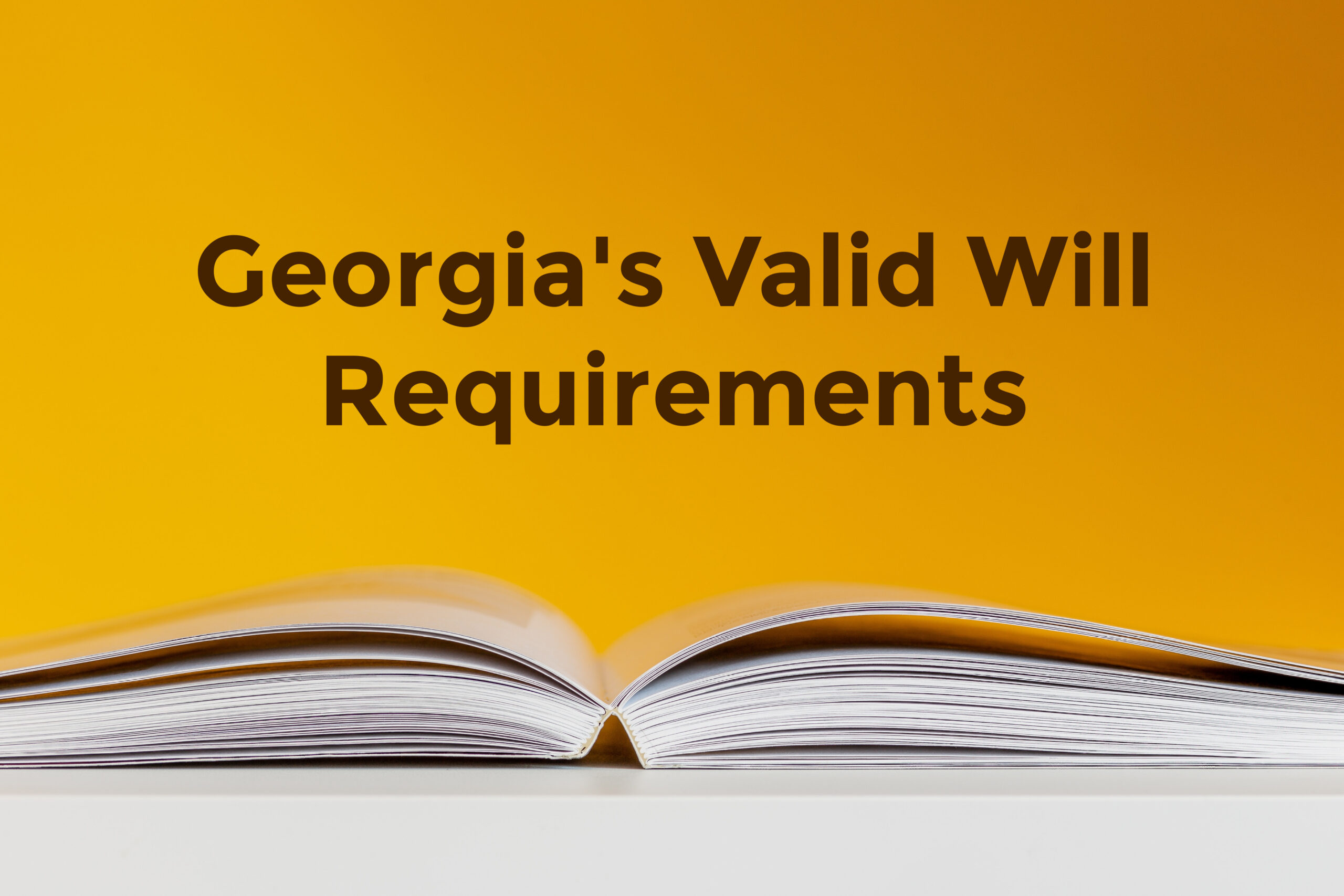It isn’t enough just to “have a will”…
…It also needs to meet Georgia’s valid will requirements.
There are a number of movie tropes surrounding wills that aren’t true in real life: the reading of a will (not a thing), verbally giving something on your deathbed (not legally binding). And who could forget the last-minute will that Uncle Lou scrawled onto a napkin?
Just because you have a will doesn’t mean that it’s valid. There are several valid will requirements you will need to include if you want your will to be accepted by the Georgia courts.
Why Have a Will?
First, let’s cover why it’s important to have a will in the first place.
Almost all of us have assets and most of us have debts (curse you, student loans!). Big or small, these financial obligations have to be settled when we die.
Without a will, your family is left at the mercy of the probate courts, who can (and will) make the decisions you should have made yourself.

Consider a will as a gift to your family that allows them to handle the settling of your estate mostly stress-free. By making these decisions ahead of time, your executor can pay creditors and distribute property according to your wishes (rather than the court’s).
In most instances, it also removes any doubt about how you intend to have your assets distributed and your debts paid.
Having a will is a responsible choice to make—not for you, but for those you leave behind.
Georgia’s Valid Will Requirements
So what makes a will valid?
We’ve all seen a TV show or movie where fortunes were made and lost because someone discovered Uncle Lou’s hastily-scribbled-on-a-napkin will.
In reality, there’s a bit more that goes into creating a valid will.

Is It a Will?
The first thing that needs to be determined is whether or not the document in question is actually a will.
According to Georgia law, a will is a document that is intended to convey an interest only upon the testator’s (i.e. creator’s) death.
For example, say you want a friend to receive your record collection when you die. Your will should explicitly state that s/he must wait until your death to receive it. If you want that same friend to receive your record collection today for their birthday, you are conveying a “present interest” instead. This would not be a will.
Is the Will Valid?
Your Uncle Lou might have intended that napkin note to read like a will, but that in and of itself doesn’t make a will valid.
For a will to be valid in Georgia, the testator must be at least 14 years of age and not “laboring under some legal disability arising either from a want of capacity or a want of perfect liberty of action.”
Basically, this means that the testator is capable of making a rational decision (known as testamentary capacity) and did so on their own.

Testamentary Capacity
Testamentary capacity is the legal term for someone’s psychological capacity to make “rational” decisions.
However, Georgia law is fairly open-minded when it comes to testamentary capacity. For example, even “insane individuals” are permitted to create a Georgia will during a lucid moment. Similarly, you can be incapacitated in such a way that makes you unable to enter into a contract, yet still be able to create a will.
If you are trying to validate (or invalidate) a will, having an estate or probate attorney on your side will prove invaluable.
Freely and Voluntarily Executed
One of the most important valid will requirements is that the testator was acting according to their own wishes.
Any wills created through bribery, coercion, blackmail, fraud, duress, undue influence, force, or any form of misrepresentation are not considered valid.
Here are some examples of misrepresentation, using poor Uncle Lou to help us illustrate:
- Lou’s daughter, Frieda, tells her father that he can no longer see his grandchildren unless he names Frieda the sole inheritor of his property.
- Lou’s accountant drafts a will naming himself as beneficiary, but tells Lou that it’s a standard “tax form” to get him to sign it.
- On his deathbed, Lou’s sister, Betty, lays on the charm to get Lou to sign a new will that names Betty’s son as sole beneficiary.
- Lou’s nephew, Ben, has fallen on hard times and begs Lou weekly (with tears in his eyes) to leave him $40,000 in the will.
In any of these situations, Uncle Lou’s will would be considered invalid and his estate would go through probate.
Format
Currently, Georgia requires that wills take the form of a written document (digital wills are not acceptable yet), but does not accept handwritten wills.
Even if it’s on a napkin. (Sorry, Lou.)
Witnesses
Another valid will requirement is the presence and signature of two competent witnesses who are older than 14.
Otherwise, you may choose anyone you like to be a witness, but it is best to choose disinterested parties who are not named beneficiaries in the will.
The witnesses and testator must sign the will in front of each other. It is not necessary to have the will notarized, but this will speed up the probate process, as the courts will not have to track down the witnesses.

What If I Change My Mind?
Your will can be changed or revoked at any time.
Simple changes and additions may only require an express amendment. If you want to redo your entire estate, it may be simpler to revoke the previous will and create a new one. For the sake of your Personal Representative (i.e. Executor), make any changes or revocations easily understood.
Revocation of a will can also be implied.
The most common form of implied revocation is the existence of a subsequent will that is inconsistent with a previous one. For example, if you create a will in 2012 that is not consistent with the will you wrote in 2009, the court will rely on the newer will for dispersion of property and settling of debts.
Need a Georgia Will?
Creating a will that adheres to Georgia’s valid will requirements is not just a smart idea, it is the only way to ensure that your property, assets, and debts are dealt with according to your wishes.
But as you can see, creating a valid will doesn’t happen by accident.
If you’re trying to build a comprehensive estate plan, it’s best to use the guidance and assistance of a licensed Georgia attorney to make sure that you don’t forget to check any boxes.





